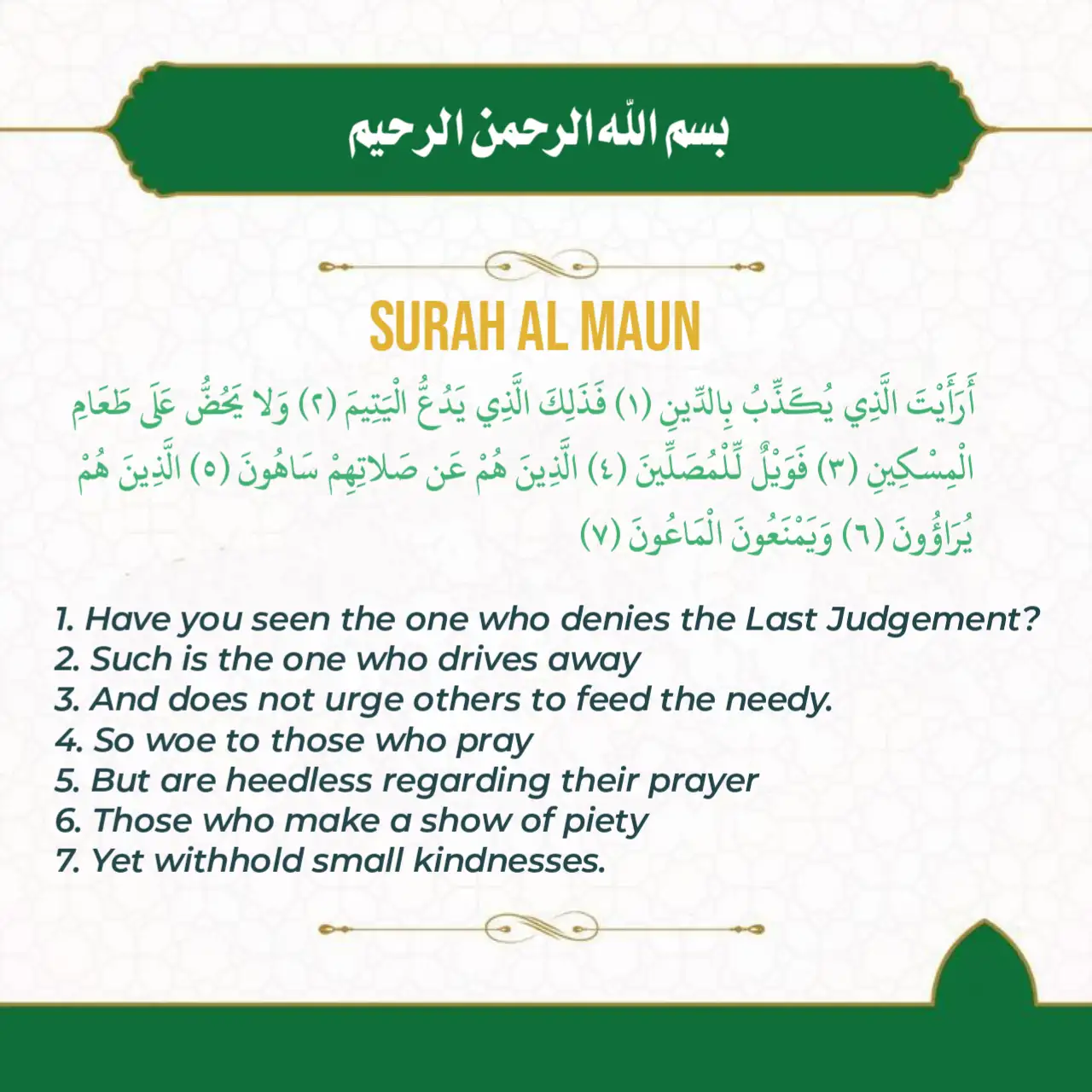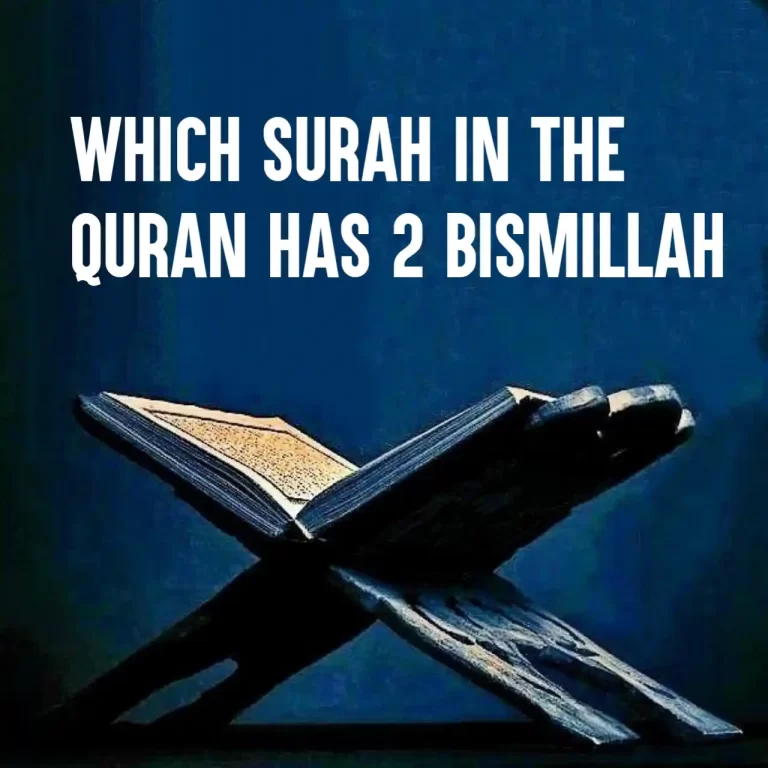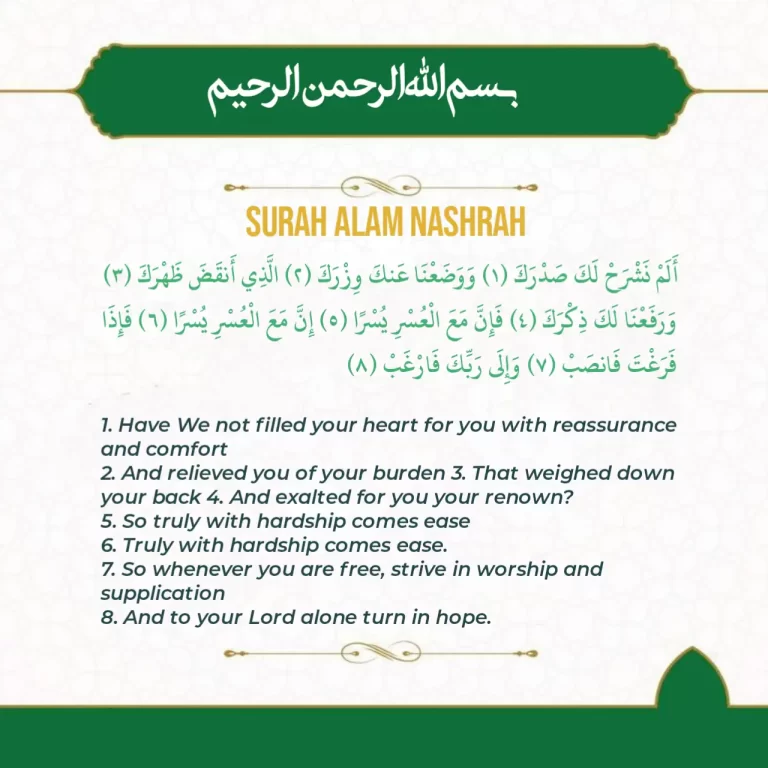Surah Araital Lazi Translation, Arabic Text, & Transliteration (Surah Al Maun)
The 107th chapter of the Holy Qur’an is Surah Al Maun or Surah Araital lazi. Check out it translation, transliteration and lessons of this beautiful surah.
Advertisements
Surah Araital Lazi Meaning In English
- Have you seen the one who denies the Last Judgement?
- Such is the one who drives away.
- And does not urge others to feed the needy.
- So woe to those who pray.
- But are heedless regarding their prayer.
- Those who make a show of piety.
- Yet withhold small kindnesses.
Araital Lazi Surah Transliteration
- Ara aital lazee yu kazzibu bid deen
- Fa zaalikal lazi yadu ul yateem
- Wa la ya huddu alaa ta’amil miskeen
- Fa wai lul lil mu salleen
- Al lazeena hum an salaatihim sahoon
- Al lazeena hum yuraa oon
- Wa yam na oonal ma oon
Surah Al Maun In Arabic
بِسْمِ اللهِ الرَّحْمٰنِ الرَّحِيْمِ
- أَرَأَيْتَ الَّذِي يُكَذِّبُ بِالدِّينِ (١)
- فَذَلِكَ الَّذِي يَدُعُّ الْيَتِيمَ (٢)
- وَلا يَحُضُّ عَلَى طَعَامِ الْمِسْكِينِ (٣)
- فَوَيْلٌ لِّلْمُصَلِّينَ (٤)
- الَّذِينَ هُمْ عَن صَلاتِهِمْ سَاهُونَ (٥)
- الَّذِينَ هُمْ يُرَاؤُونَ (٦)
- وَيَمْنَعُونَ الْمَاعُونَ (٧)
Summary Of Surah Al Maun
| Classification | Makki |
| Position | 30 juz |
| Order | 107 |
| Number of verses | 7 |
| Names | Small kindness |
| Before Surah | Surah Quraish |

Al Maun Surah Explaination
In Surah Maun, Allah criticises those who fail to fulfil their duties towards Him and towards His slaves.
First verse, Have you seen the one who denies the Last Judgements that is, he denies the resurrection and the requital, so he does not believe in what the Messengers taught.
Verse two, Such is the one who drives away the orphan that is, he pushes him away with violence and harshness.
Advertisements
And does not show compassion towards him, because of his hardheartedness and because he does not hope for any reward or fear any punishment.
Verse three, and does not urge others to feed the needy means so it is more likely that he will not feed any poor person himself.
Verse four, So woe to those who pray that is, those who pray regularly.
But they are heedless regarding their prayer that is, they are negligent concerning it, and they do not pray on time or do the movements of the prayer properly.
This is because of their lack of concern about the command of Allah, for they neglect the prayer, which is the most important act of worship and the best of deeds that will bring one closer to Allah.
Advertisements
And being heedless regarding the prayer is something for which a person deserves blame and criticism.
As for making mistakes in the prayer, this is not regarded as heedlessness.
Because it is something that happens to everyone, and even happened to the Prophet Hence Allah describes these people as showing off, being hard hearted and lacking compassion, as He says:
Advertisements
Those who make a show of piety
They do good deeds in order to be seen by people.
As for the last verse which translates, yet withhold small kindnesses.
That is, they refuse to give things that will not cost the giver much, either by way of lending or giving, such as vessels, buckets, hammers and the like, which people usually lend or give away and are generous with.
But these people, because of their great stinginess, withhold small kindnesses, so how about anything that is more than that?
Lessons Of Ara Aital Lazi Ara Aital lazi Sura
This surah is urging people to show kindness towards orphans and the needy, and to encourage others to do likewise.
To pay attention to the prayer and pray regularly, and to be sincere in one’s prayer and in all one’s deeds.
It also urges people to do acts of kindness by doing small things, such as lending vessels, buckets, books and the like, because Allah criticises those who do not do that.
And Allah (SWT) knows best what is correct.
Praise be to Allah, the Lord of the worlds.
What Does Surah Al Maun Mean?
The word al-maun means small kindness, it appears at the conclusion of the last verse, and it was used to name the surah.
There are two points of view on its revelation and about whom the description within it was given.
The first view is that the second half of the surah was revealed in Madinah because it refers to hypocrites and those who are weak in faith.
Munafiqun (hypocrites) gained recognition and influence in Madinah only after Islam.
They declared themselves Muslims but were planning against the Prophet SAW in secret because they did not openly oppose him.
Simultaneously, they made an effort to be seen at masjid prayer in order to be counted among the good Muslims.
The second view is that it describes corruption present in Mecca before the hijrah and depicts some features or characteristics of the disbelievers from Quraysh.
They were completely careless and felt no obligation for weaker members of society because they did not think that Allah would call them to account for their conduct in a future life.
In any case, describing such people’s behaviour emphasises the fact that man will not have a clean and firm character unless he believes in the hereafter.
Surah Araital lazi threatens destruction to those who pray with the people merely to be seen as religious and not out of obedience and devotion to their Lord.
This is clear in their actions, as if they were true believers, they would have done more generously and kindly.
The first verse addresses the Messenger of Allah in a way that expresses favour and partiality for him while criticizing his opponent.
It is also indirectly addressing every thoughtful, perceptive individual.
Ara’ayta can mean there things:
- Did you see?
- Have you considered?
- Do you know?
Have you ever seen or thought about someone who denies the hereafter’s rewards and punishments?
The term deen here refers to restitution and reparation, as Allah says,
Maliki yawm id deen
Allah will judge each individual on Yawm al-Qiymah, and then complete recompense will be granted for whatever virtue or bad was earned throughout one’s life on earth.
The question in the first verse isn’t meant to check if he’s ever seen someone like that.
But rather to make one consider the actions of people who do not believe in their own accountability or who do not believe in a future in which justice would be restored.
As a result, the surah states that belief in the Hereafter has a moral significance.
Deniers of the Recompense are described as oppressing orphans and refusing to give them their right.
If the orphan came to him for assistance, he would turn him down without even showing him compassion.
He wouldn’t feed him or utter a nice word to him; instead, he’d chase him away from his sight.
Similar are the words in Surah al Fajr, Allah Says:
No! But you do not honor the orphan, and you do not encourage one another to feed the poor.
The miskeen is a needy who does not have enough to eat or meet his basic necessities.
Most people are ignorant of his situation because he is either too proud or too shy to seek for help.
He was described by the Prophet SAW as follows:
“The miskeen is not one who circulates among the people who can be satisfied with a snack or two or a date or two, but rather one who lacks means of self-sufficiency, while no one is aware to provide him sadaqah and he will not beg of people.”
One who denies recompense in the Hereafter, will not be bothered with the needs of an orphan, a poor person or any of the weaker members of society.
He believes that he is within his rights, that he is not responsible for the misfortune of others, and that he is the sole recipient of all blessings.
He feels that the less fortunate are undeserving or that they are being punished for misdeeds committed by others, as if they were faultless themselves.
And when it is said to them,
Spend from that with which Allah has provided you,
The unbelievers say to the believers,
Should we feed him whom if Allah had willed He would have fed? You are not but in manifest error.
They further claim that since Allah has decreed everything, it is pointless to try to improve the plight of the poor, shamelessly shifting blame from themselves to their Lord.
They are unconcerned about their eventual return to the Creator, when they will be stripped of all their money and power.
Everything they had unlawfully and unjustly concealed will become an inescapable and stifling burden around their necks on that Day, and they will confront the Recompense they had previously refused.
Through these two conspicuous examples, which every decent person will find repulsive,
Allah SWT shows how those who deny the Hereafter are afflicted with evil conduct.
They become so self-centered and insensitive that they are unwilling to make even little sacrifices for the sake of others.
According to Ibn Abbas and others,
This refers to the hypocrites who pray in public but do not pray in private.
They don’t mind if they miss prayers when no one is around to hear them. Commentators frequently use the words of Ata’ bin Dinar to explain this ayah:
Praise be to Allah who said, ‘ʽan salatihim sahun’ (are heedless of their prayer) and did not say, ‘fee salatihim sahun’ (are heedless in their prayer).
The first category includes those who either do not think to pray at all or do it in a hypocritical manner.
The second would refer to a loss of concentration or forgetfulness during the prayer.
And it’s something that even the most sincere believers can’t seem to resist at times.
It’s a human flaw, but it’s not a sin.
However, as mentioned in this ayah, being careless of the prayer means neglect of it completely or merely going through its motions mechanically, without consciousness of Allah in the heart.
Those who do not want the Hereafter’s reward will not pray truly to Allah, and will only do it because others require it of them.
While they pretend to be virtuous, it is only for show.
As Allah said:
Indeed, the hypocrites [think to] deceive Allah, but He is deceiving them.
And when they stand for prayer, they stand lazily, showing [themselves to] the people and not remembering Allah except a little.
Those who show or display something to others are referred to as yura’un.
They perform acts of goodness and worship in order for others to see or hear them, in order to earn position and status among them, to gain acclaim and admiration, or to achieve some worldly goal.
Quraysh’s powerful men would perform a display of prayer at the Kabah to demonstrate to the populace that they were its keepers.
This is why some early scholars would say,
Examine one’s intention (niyyah), for it is a far more important matter than one’s actions.
For it is the intention that distinguishes a righteous deed from that of a hypocrite or that which is done for the sake of worldly gain, the truth of which is known only to Allah.
Scholars have pointed out that an unbeliever’s actions outweigh his intentions, but a believer’s intentions [to please Allah] outweigh his actions.
Maun implies objects of common use, such as a cooking pot, bucket, hatchet, balance, or other minor articles of common use that people commonly borrow from one another, according to Ibn Abbas, Ibn Masud, and others of the Sahabah and their students.
Maun, according to Ali bin Abi Talib, also includes zakah, which is a modest sum taken from ample wealth that one must give in order to help the poor.
Those who withhold and avoid such tiny kindnesses and courtesies will not go to any lengths unless they believe they would benefit in some way in the world.
According to Ibn Katheer,
This implies that they do not properly worship their Lord or treat His creation.
They do not lend something to others that may benefit or assist them, even if the item is intact and will be returned to them.
When it comes to zakah and other forms of generosity that bring one closer to Allah, they are even more stingy.
Conversely, sincerely motivated worship will affect a person’s heart, cause him to remember his Lord and to act righteously toward his fellow human beings.
Advertisements








2 Comments